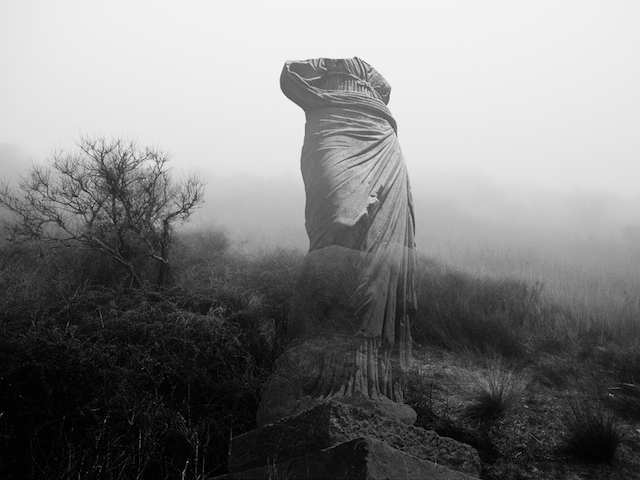A changing consciousness within Mu Dan’s poetry stirs a listening in his translator

March 15, 2019
The following poem by Mu Dan, with translation and essay by Emily Goedde, is the sixth installment in The Pronoun folio of the Transpacific Literary Project. Find the rest of the folio here.
我
從子宮割裂,失去了溫暖,
是殘缺的部分渴望著救援,
永遠是自己,鎖在荒野裡,
從靜止的夢裡離開了群體,
痛感到時流,沒有什麼抓住,
不斷的回憶帶不回自己,
遇見部分時候在一起哭喊,
是春戀的狂喜,想衝出樊籬,
伸出雙手來抱住了自己
幻想的形象,是更深的絕望。
永遠是自己,鎖在荒野裡,
仇恨著母親給分出了夢境。
(1940)
I [ ] 我
Cut from the wombdeprived of warmth
[Who] is a damaged part desperate to be saved
The self is alwayslocked in wasted plains
[Who] goes from changeless dreams and leaves the rest
[Who] aches in the flow of time with nothing to hold
Unbroken memories can’t return the self
When they find each other [who] cries out
[Who] is the mad happiness of first lovewanting to break free
Reaching out two hands and embracing only a self
Fantasized form [who] is deeper despair.
The self is alwayslocked in wasted plains
Hating the dreams that mother fracted forth.
I think about translation as a kind of listening to the echoes created as meaning moves between languages. I mark a space [ ] in the title of my translation of Chinese WWII era poet Mu Dan’s original “我” and my “I”. I ask: What knowledge is generated by putting languages in relation to one another? What can be gained through a greater attention to the process rather than the product of translation? More specifically, what can be discovered within the movement and change occurring in the act of translation between Mu Dan’s study of the individual in his poem “我” and my translation ”I”?
Mu Dan was one of the most highly regarded Chinese poets to come of age during the Second World War. With the given name 查良錚 Zha Liangzheng, Mu Dan was born into “a family in decline,” which is to say a formerly affluent, scholar-official family whose men had held posts in the imperial government. Mu Dan’s father found it hard to adapt to life in quickly changing, post-imperial China, so after his mid-30s he did not work, but instead relied upon the small inheritance that he shared with his brothers. Mu Dan grew up in poverty but was still able to attend one of the best high schools in China, Nankai Secondary School, and, at 17, he tested into Qinghua University, one of the nation’s best. At Qinghua, and later at Lianhua University in Kunming, where he lived for part of the war, Mu Dan studied English and Russian literature. He spoke both so fluently, in fact, that later in his life when he could not write poetry for political reasons, he produced marvelous translations of poetry by Byron, Pushkin, Eliot and others.
Mu Dan’s poetry addresses these difficult times through intense exploration of subjectivity. Critic Liang Bingjun (梁秉鈞) writes, “the difference between Mu Dan and the earlier generation of poets, indeed the source of his modernism, is his conscious and complicated poetic experimentation with the ‘I’” (47). Similarly, poet and scholar Tang Shi (唐湜) writes, “We must take the ‘I’ as a point of departure for understanding Mu Dan’s poetry. This ‘I’ is a ‘shattered fragment,’ eternally hoping for its completion” (94). Literary critic Xiao Ying (簫映) reads “the ‘I’ in [Mu Dan’s] work to be interwoven with contradiction and conflict. [….] The comprehension and contemplation of the crisis of the subject [an asking of ‘Who am I’] is the element of Mu Dan’s work that created an entirely new consciousness in Chinese poetry” (87).
These critical readings are instructive in underlining how important the question of “I” was to Mu Dan and his poetry. I want to focus on this complexity and let Mu Dan’s choice not to include pronouns (a completely natural and grammatical choice in Chinese) guide how I hear the poem. Rather than fill in the questions this lack of pronouns raises, I leave the spaces they create open.
[Who] is a damaged part desperate to be saved
I must confess that, after working with this poem for so long, I have come to read it as an allegory for translation. Its study of a piece, broken from a whole, resonates with the process of translation: The translator breaks the poem away from the original language, searching for answers even while leaving the original behind. There is a sense of floating, a movement towards something that is neither the new language nor the old one. Here, there is little to hold onto. When the translator can finally recognize the translation and the original as distinct beings, the space that remains between the two seems to resonate with the insights created by their differences.
But Mu Dan most likely did not intend this kind of reading. Considered alongside his other poems from this period, it is more likely he was concerned with the birth of identity. Mu Dan himself suggests this in his own translation of the poem. His own English version was published, undated, in a posthumous edition of his collected works:
Myself
Split from the womb, no more in warmth,
An incomplete part am I, yearning for help,
Forever myself, locked in the vast field,
Separated from the body of Many, out of a still dream,
I ache in the flow of Time, catching hold of nothing,
Incessant recollections do not bring back me.
Meeting a part of me, we cry together,
The mad joy of first love, breaking out of prison,
I stretch both hands only to embrace
An image in my heart, which is deeper despair,
Forever myself, locked in the vast field,
Hate mother for separating me from the dream.

Mu Dan’s translation is illuminating. His rendering of “the body of the Many” and his “ache in the flow of Time, catching hold of nothing,” with their intentional capitalization, support scholar Jiayan Mi’s allegorical reading of the poem: a narrative about the crisis of an individual in a time of momentous change. Mi places the poem’s splintered I in contrast with other Chinese poets, most notably Guo Moruo, who in his 1921 collection, The Goddesses, sang of the 我 as a new kind of modern subject—a space for creation and creativity. Guo’s 我 was a powerful, passionate self that would be able to take control, not only of his individual fate, but also of the fate of the Chinese nation. Mi reads Mu Dan’s poem “我,” written twenty years later, as a record of the implications of this “freed self.” Its subject is the “problematic modern self who is newly split from its motherhood (read as native origin, great tradition, and collective history)” (250). This allegorical reading of “我” attests to Mu Dan’s engagement in Chinese intellectuals’ struggles to create their own histories, and their own place in a world that has become international on unequal terms.
Despite his focus on the I, Mu Dan never uses the word 我 in the Chinese poem. While the title suggests its presence, it is absent from the verse itself. In fact, the poem doesn’t include any pronouns. As they aren’t needed for a Chinese sentence to be grammatical, poets often choose not to include them. But how does one write an English poem without pronouns?
More than once, as I have worked through my translation of “我,” I have wanted to add pronouns and be done with it. Why choose [who]? First, I want to underline the differences between my translation and Mu Dan’s poem. My “I” cannot be Mu Dan’s “我.” I insist on this obvious fact, not to unnecessarily foreignize or differentiate, but because it is in the space between “我” and “I” that translation teaches us, and, if we pretend the translation can replace the original, or some parts of the original, we lose the ability to listen to the echoes this relational space creates.
The lack of pronouns is a common complaint for translators between Chinese and English and is often smoothed over rather than fully engaged. Yet poets choose this elision for good reasons. As we can see, Mu Dan makes aesthetic choices that bear the effects of his personal exploration of the self. In Chinese, he doesn’t have to indicate a subject, so he doesn’t. He lets the possibilities open up. I.You.He.She.We.They.
As a reader of poetry, I embrace this openness and the possibilities offered by the non-existent pronoun. If it weren’t for the grammatical rules of English, I imagine English-language poets would make great use of it too. And rather than complain about how it’s lost in translation from Chinese to English, I want to see if we might find a way to bring our attention to it. For, on a level beyond the poetic language itself, playing between the inclusion of subject pronouns and their omission allows us to consider how syntax and structure work as conceptual framework, and how we might see beyond these frames if we move between languages and systems of thought.

In the Dictionary of Untranslatables: A Philosophical Lexicon, which was translated from French into English, there are several entries about the difficulty of translating terms related to I and the self.
At certain moments in its history, the term “self” has posed
some interesting problems for translators of philosophy.
In 1700 Pierre Coste, the French translator of Locke’s
Essay on Human Understanding, proposed the innovative
soi in order to simultaneously insist on the reflexive
dimension contained in the English self and take his distance,
following Locke himself, from the moi (or ego) introduced by
Descartes and Pascal. (Rendall, trans. 947)
Here, for example, a French translator uses his craft to introduce into French a term that includes a sense of reflection on one’s personal identity, which is not included, and is even opposed to, earlier French systems of thought, such as those at the heart of the work of Descartes and Pascal.
I bring this up, not to dwell on this philosophical history of the “self” and its translations, but rather to point out that not only is it a difficult notion to translate in omission (in Chinese poetry, for example), but to show that even if the terms are there to translate, they might not mean exactly the same thing. Translating a term like I is both a poetic and philosophical matter.
So what differences might there be between the two pronouns 我 and I? I would like to suggest that 我 marks a contingency that I does not. 我 draws from religious and philosophical traditions that are different from those of I, which comes from a Judeo-Christian/Greco-Roman world. In Buddhism and Daoism, 我 is not understood to be an individual and eternal soul created by God, for example, but rather a mark of both one individual’s everyday perceptions, as well as the notion that all these perceptions of permanence or autonomy are illusions. In Confucian texts, by contrast, we often find another first person pronoun, 吾 wu. It suggests how one’s identity is contingent upon one’s relationships to others. In this contingency humanity will continue, even as the individual 我 will perish.
It is worth noting, as Jiayan Mi suggests above, that Mu Dan was living in a semi-colonized nation. It is within this socio-political context that Chinese poets of the early 20th century were thinking through the relationship of the 我 to a quickly changing, incredibly violent world. Mu Dan’s “我” is not only a coming-into-consciousness poem, it is also as a war poem. In the 1947 edition of Mu Dan’s Collected Works, which Mu Dan arranged himself, his poem “我” appears just before a poem entitled “The Coming of Knowledge,” also written in 1940. This latter poem is a clear meditation on war and its effects on the individual: “Take someone to the train, turn the head, turn the back, abandonment / Heartrending loyalty, the endless division of an individual 送人上車,掉回頭來背棄了/動人的忠誠,不斷分裂的個體 song ren shang che, diaohui tou lai bei yi le / dong ren de zhongcheng, bu duan fenlie de geti.
The [ ] space between 我 [ ] I holds the differences between Chinese and English syntax and allows these differences to resonate. It may also be a space to hold both the Buddhist 我 that understands all of this experience to be an illusion, and the new 我 of Mu Dan’s changing world, a world at war.
I cannot write from Mu Dan’s experience. I can listen to what he writes and record my process of listening in my translation. I can write an “I” that reverberates with his “我,” and in so doing, consider what the two poems, in relation, have to teach.



